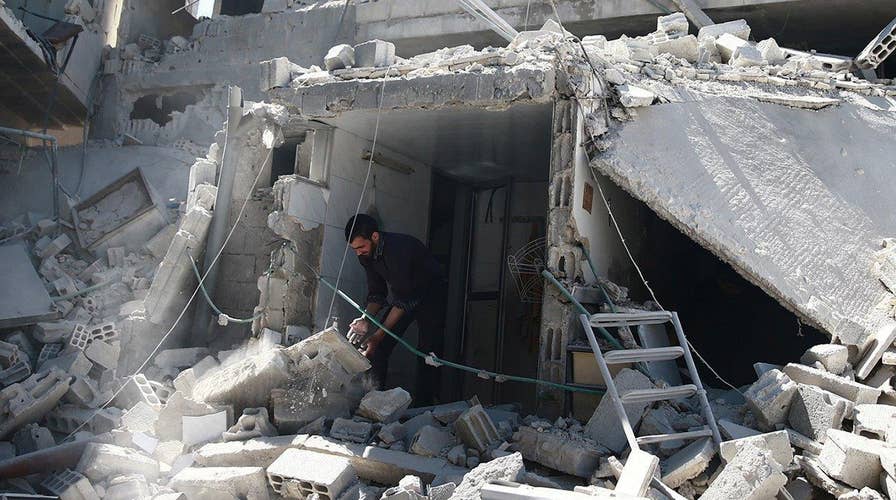Suspected chemical weapons attack kills dozens in Syria
The Syrian government denies carrying out the attack as the death toll continues to rise; Kitty Logan reports for 'Special Report'
North Korea and Syria have a long history when it comes to the issue of chemical weapons. Pyongyang helped Syria build chemical weapons factories in the ‘90s, and they’ve been caught multiple times sending Syria items including protective coats and gas masks – the kinds of things that keep people safe when handling chemical agents.
Now, with North Korea responding to what it calls the "reckless" U.S. airstrikes in Syria by vowing to bolster its defenses "in every way," there is a renewed interest in the seemingly cozy relationship between the two rogue nations.
In a recent piece for FoxNews.com, Fox News Contributor Judith Miller and Charles Duelfer, a former deputy chairman of the U.N. weapons inspection agency, suggested that President Trump's decision to launch dozens of Tomahawk cruise missiles into Syria "sends a strong message not only to Syria but to several other states and groups with a stake in the outcome of that country’s brutal civil war.
SYRIA'S ALLIES CLAIM UNITED STATES CROSSED THEIR OWN 'RED LINES' WITH MISSILE STRIKE
"To North Korea, the strike is a warning," they wrote, a warning that suggests "the U.S. will not permit Pyongyang to threaten American security by marrying its small nuclear arsenal with intercontinental ballistic missiles capable of reaching our shores."
The pair added that "North Korea is also believed to possess chemical weapons" that could be used against American forces and their allies in South Korea. And some believe that North Korea could use more than a warning when it comes to the issue.
In a tweet last week, Joshua Stanton, a Washington-based attorney who has advised the House Foreign Affairs Committee on legislation related to North Korea, suggested that if the U.S. wants to "send a message to N. Korea via Syria, hit the N. Koreans in Syria who help Assad use chemical weapons."
RICE CLAIM ON SYRIA CHEMICAL WEAPONS GETS 'FOUR PINOCCHIOS'
Stanton was referring to the long and documented history of North Korea working with Syria to produce both chemical and nuclear weapons. And he isn’t the only one who has been sounding the alarm for years.
Former CIA director James Woolsey, who also served on President Trump's transition team, told the House Foreign Affairs Committee in 2013 that the relationship between the two nations goes back decades. "Aside from Russia, the principal strategic partner of the Iranian and Syrian regimes has been North Korea," Woolsey claimed.
The former CIA chief testified that "in the early 1990’s, the North Koreans helped the Syrian Scientific Studies and Research Center (SSRC) construct missile complexes." The New York Times has described the SSRC as "the country’s main research center for work on biological and chemical weapons." One of those facilities, Woolsey added, was "used for fitting chemical warheads on Scud missiles."
Woolsey says an explosion at the facility in July 2007 revealed that North Korean engineers were actually working on the ground with their Syrian -- and Iranian -- partners. A few months later, North Korean engineers also reportedly were found among the victims after another explosion at a facility in Syria. This time, the blast occurred at a secret nuclear compound that was modeled after one of Pyongyang's own reactors.
As confirmed in a report from the U.N. Security Council, several shipments of clothing designed to protect people from chemical agents were seized on their way from North Korea to Syria in 2009. The materials included upwards of 13,000 protective coats, gas masks and more.
In 2013, authorities in Turkey discovered more gas masks, along with some 1,400 rifles and thousands of bullets, in a vessel that was on its way to Syria from North Korea.
According to data from the non-profit Nuclear Threat Initiative, North Korea is also said to have a specific focus on the production of the nerve agents sarin and VX. Early assessments of last week’s attack in Syria, an attack in which more than 80 people were killed, suggest sarin was most likely one of the compounds that was used. VX is believed to be the chemical agent that was used in the murder of North Korean dictator Kim Jong Un’s estranged half-brother earlier this year.
Just days after last week's deadly attack in Syria, Kim was sending Syrian President Bashar al-Assad a congratulatory message on a seemingly unrelated topic, according to an article from South Korea's Yonhap news agency.
The message was said to mark the 70th anniversary of Assad's political party, and the North Korean leader added that the “two countries' friendly relations will be strengthened and developed, given their fight against imperialism."
After last week's airstrike in Syria, a North Korean official warned that Pyongyang's "tremendous military muscle with a nuclear force as its pivot" would foil any possible future aggression by the U.S.
Secretary of State Rex Tillerson suggested over the weekend that "there's a shared view [among President Trump and some foreign leaders]… as to how dangerous the [North Korea] situation has become."
On Saturday, the Pentagon announced that a Navy carrier strike group was on its way to the Korean peninsula "to maintain readiness and [a U.S.] presence" in the region.
President Trump also spoke with his South Korean counterpart over the weekend, with the pair agreeing to stay in close contact about North Korea and other issues.
Fox News' Georeen Tanner contributed to this report.









































